In this article:
The delectable aroma of many aromatic teas and Indian sweet and savory dishes is ascribed to the tiny black seeds of cardamom. Cardamom is an exotic spice native to the culinary and medicinal practices of India.
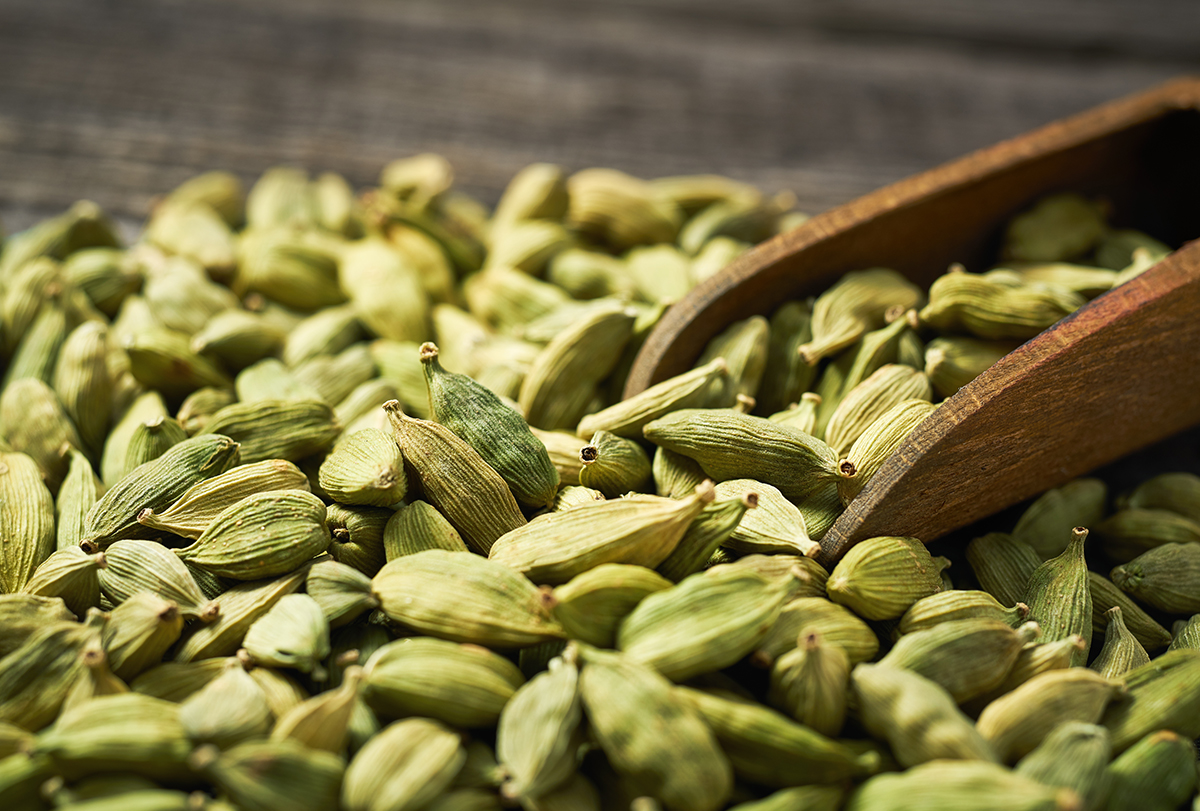
Regarded as the queen of spices, cardamom (Elettaria cardamomum) ranks third in the category of the most expensive spices, with vanilla and saffron holding the first and second places respectively.
Cardamom is a herbaceous perineal plant belonging to the family of turmeric and ginger. Native to the bountiful forests of India, Bhutan, and Nepal, cardamom comes in black, green, and white varieties. The white variety is a bleached version of the green pods.
The rich characteristic fragrance of cardamom is accredited to the presence of antioxidant terpenes, namely, 1,8-cineole and alpha-terpinyl acetate. Aside from being a versatile kitchen ingredient, cardamom offers numerous health benefits.
Cardamom is also considered for its medicinal uses in Ayurveda and Greek medicine and Chinese tradition. Owing to its rich nutritional profile, cardamom offers the properties of a digestive, diuretic, expectorant, stimulant, antiseptic, antioxidant, and antispasmodic. (1)
Nutritional Content of Cardamom
Cardamom is extolled for its prolific blend of volatile oils, vital vitamins, and minerals including potassium, calcium, and magnesium along with iron and sulfur.
Furthermore, it houses antioxidants, namely, propanoids, flavonoids, and terpenes, which can be immensely beneficial to the human body. (2)
Nutritional value of cardamom per 100 grams:
| Nutrient | Quantity | Amount |
|---|---|---|
| Water | g | 8.28 |
| Energy | kcal | 311 |
| Protein | g | 10.76 |
| Total lipid (fat) | g | 6.7 |
| Carbohydrate | g | 68.47 |
| Fiber | g | 28 |
| Vitamin C 21.0 mg | mg | 21 |
| Thiamin | mg | 0.198 |
| Riboflavin | mg | 0.182 |
| Niacin 1.102 mg | mg | 1.102 |
| Vitamin B6 | mg | 0.23 |
| Calcium, Ca | mg | 383 |
| Iron, Fe | mg | 13.97 |
| Magnesium, Mg | mg | 229 |
| Manganese, Mn | mg | 28 |
| Phosphorus, P | mg | 178 |
| Potassium, K | mg | 1119 |
| Sodium, Na | mg | 18 |
| Zinc, Zn | mg | 7.47 |
Health Benefits of Cardamom
Now that you are well aware of the nutritional richness of cardamom, it’s time to be acquainted with the buffet of health benefits that cardamom has in its bag.
1. Strengthens and stimulates digestion
Cardamom has cumulative properties that can aid in the digestion process. It may treat colic and stomach cramping and reduce flatulence and bloating. Plus, it increases the flow of bile, which is essential to the digestion of fats. (1)(3)
In a study conducted on rats, the gastroprotective effects of a combination of turmeric, sembung leaves, and cardamom pods were highlighted. It was found that the groups receiving the herbal infusion combination showed a lesser incidence of mucosal damage and gastric ulcers as well as lesser number of mast cells and eosinophils than the control group. (4)
The gastroprotective effects of cardamom make it a master solution for a host of digestive problems, such as constipation, dysentery, acidity, indigestion, and different types of stomach infections.
How to consume:
To relieve your digestive ailments, you can consume the seeds plain, sprinkle cardamom powder in your rice or curries, or go for a healthy cup of cardamom tea.
As cardamom seeds have a pungent, sweet flavor, it is relished by almost everyone, including children.
2. Promotes dental hygiene and fights bad breath
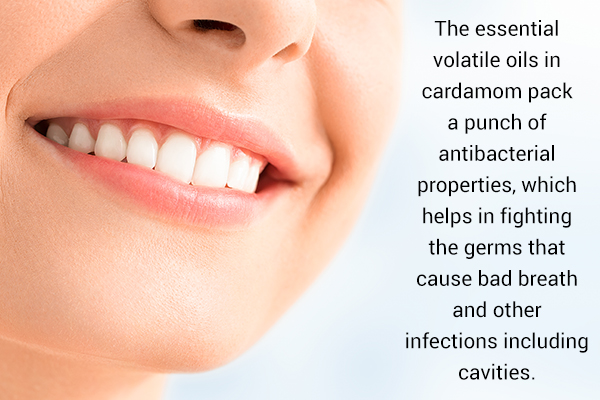
The distinctively pleasant fragrance and strong flavor of cardamom can fight bad breath. The essential volatile oils in it pack a punch of antibacterial properties, which helps in fighting the germs that cause bad breath (5) and other infections including cavities.
The pungent spicy flavor promotes the flow of saliva and aids in maintaining oral health. (6)(7)
A study published in the International Journal of Clinical Preventive Dentistry supported the efficacy of a mouthwash containing 0.5 percent cardamom essential oil to overcome halitosis. The experimental mouthwash containing 0.5 percent cardamom essential oil was more effective than Listerine and placebo mouthwashes. (8)
How to consume:
- To reap the benefits of cardamom on your oral hygiene, simply chew on a pod of cardamom after every meal.
- Rinse your mouth with lukewarm cardamom tea twice daily. It will work as an effective antiseptic mouth rinse without any side effects of an alcohol mouthwash.
3. Improves appetite
Cardamom works as a warm digestive tonic that can help you deal with indigestion, flatulence, and acidity, which can reduce your appetite. Plus, it stimulates the secretion of digestive juices, which in turn improves your appetite. (9)(10)
How to consume:
Add a little bit of powdered cardamom to your soup or chew some of its seeds to reactivate your appetite.
4. Aids in detoxification and protects the liver
Cardamom is replete with antioxidants and manganese, which aid in detoxification by scavenging free radicals and flushing out toxins from the body. (11)(12) A healthy liver is a prerequisite for a healthy metabolism and the secret to a long lifespan.
Cardamom extracts may reduce the risk of fatty liver disease and decrease the higher cholesterol and triglyceride levels. Cardamom extracts can reduce liver enlargement and also protect against liver injuries that result from an overuse of drugs, chemicals, or antibiotics. (13)(14)
How to consume:
Drink a cup of cardamom tea daily.
5. Improves kidney health
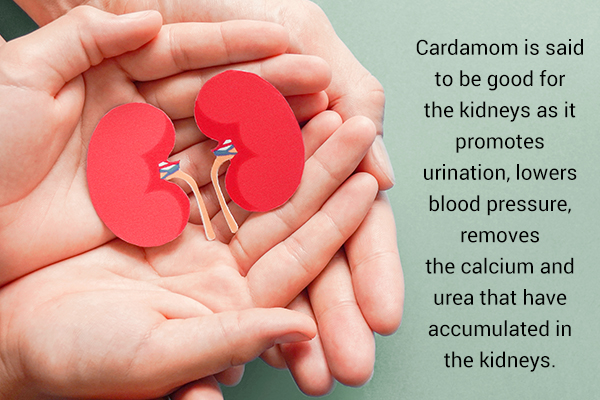
Cardamom is said to be good for the kidneys as it promotes urination, lowers blood pressure, removes the calcium and urea that have accumulated in the kidneys. (15)
A study conducted on rat models corroborated the role of the coadministration of cardamom with gentamicin to study its effects on drug-induced nephrotoxicity.
The control group who received only gentamicin suffered renal damage, whereas the experimental group who received the combination of gentamicin and cardamom had significant protection to the kidneys from gentamicin-induced damage. (16)
Regular use of cardamom can help treat a wide variety of kidney, bladder, and urinary problems including kidney stones, nephritis, burning or painful urination, and frequent urges to urinate. It is also often used in the treatment of urinary tract infections.
How to consume:
Both whole and ground cardamom can be used to improve kidney functioning.
6. Lowers blood pressure
Including cardamom in your diet can also help regulate high blood pressure.
The rich composition of antioxidants can help to reduce the aggregation of excess platelet that results in sticky, clot-forming blood. This, in turn, can lower blood pressure levels. (17)
In addition, cardamom houses potassium and magnesium, two heart-friendly minerals that can contribute to lowering blood pressure levels. (18)
A 2009 study published in the Indian Journal of Biochemistry & Biophysics found that participants who were given powdered cardamom daily for several months saw significant reductions in their blood pressure.
Cardamom also enhances fibrinolysis and improves antioxidant status without significantly altering blood lipids and fibrinogen levels in stage 1 hypertensive individuals. (19)
How to consume:
Drink cardamom tea and include cardamom in seeds or powder in your cooking and baking.
7. Treats nausea, sore throat, and vomiting
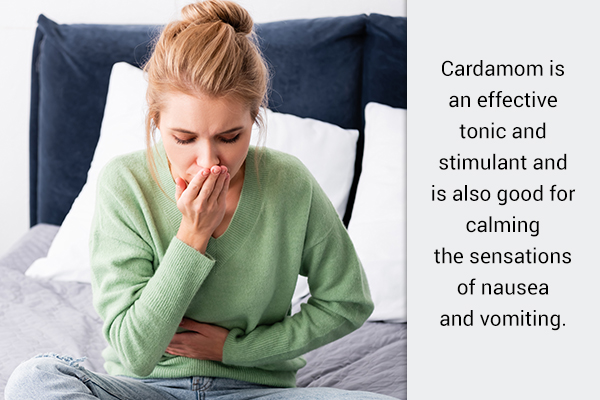
Traditionally, cardamom has been used as a remedy for nausea. Cardamom is an effective tonic and stimulant and is also good for calming the sensations of nausea and vomiting. (20) It acts as a good remedy for sore throat, too.
How to consume:
Cardamom and cinnamon can both be boiled in water and gargled every morning to control a painful sore throat. (9)
8. Alleviates asthma
Asthma sufferers can use cardamom to get relief from symptoms such as coughing, wheezing, shortness of breath, and chest tightness.
A study conducted on rabbits highlighted the effect of cardamom on asthma. Researchers found that it exhibits a bronchodilatory effect on asthma. (21)
Cardamom helps make breathing easier by increasing blood circulation within the lungs, fighting inflammation, and soothing mucous membranes. The warm nature of cardamom also promotes the expulsion of phlegm and relieves chest congestion.
How to consume:
Regular use of cardamom in small quantities is highly beneficial for those suffering from asthma or bronchitis. Simply add cardamom powder to your food or drink cardamom tea.
9. Cures cough and colds
The abundant number of antioxidants present in cardamom can help in curing colds, cough, and respiratory distress.
How to consume:
Drink cardamom tea. To prepare the tea, add some cardamom pods to boiling water, strain the water and add honey to taste. (9)
10. May prevent cancer
Consuming cardamom regularly may help prevent some forms of cancer. Cardamom contains phytochemicals that are well-known cancer fighters, namely, IC3 and DIM. It may inhibit the growth of hormones responsible for breast, ovarian, and prostate cancers, among others. (22)(23)
Also, studies have found that the powerful antioxidants in cardamom are very beneficial for those suffering from colon cancer.
A study conducted on tumors induced in mice found the chemopreventive effects of cardamom. The ingestion of cardamom is related to the reduced size and number of skin papillomas generated on the skin as a result of dimethylbenzanthracene treatment. (23)
How to consume:
To combat and ward off cancer, eat ½ teaspoon of cardamom powder daily.
How Can You Use Cardamom?
Cardamom’s rich aroma, flavor, and versatile use are the reasons behind its popularity. Cardamom pods can be stored as it is to retain the aroma, flavor, and freshness of the spice. It can be used in a variety of ways:
- Cardamom powder is used widely as a flavoring agent in cookies, desserts, and beverages. As the volatile essential oils in cardamom can be lost once ground into a powder, it is recommended to use freshly ground cardamom powder when needed. It can be prepared by breaking open the cardamom pods and crushing the seeds in a mortar and pestle.
- Add black cardamom as whole in your rice, curries, and other savory preparations.
- Cardamom tea is a popular beverage in Eastern culture. Add green cardamom seeds to your tea preparations when the water is boiling to let the essential oils steep in the water.
- You can also chew cardamom seeds.
Precautions to Consider
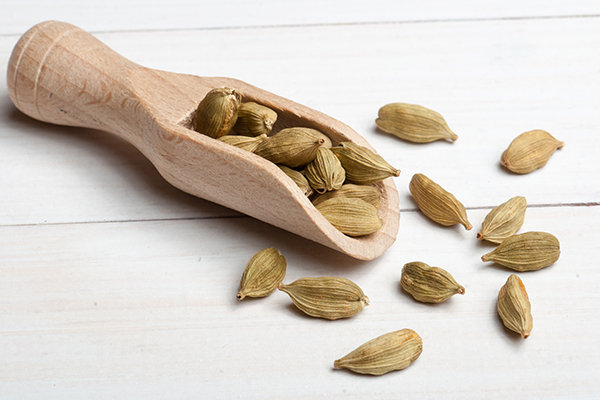
With all the benefits that come with cardamom, some people need to be mindful of their cardamom consumption to avoid any mishaps. Cardamom consumption during pregnancy may result in miscarriage and can trigger a spasmodic colic pain in people with gallstones.
This herb can cause rare cases of dermatitis and, rarely, an allergy. Cardamom should not be used by patients taking anticoagulants and people taking medications to lower blood pressure and cholesterol.
Final Word
Cardamom is an exotic spice well known as an ingredient of Indian cuisine. It is abundant in antioxidants, vitamins, and minerals. Aside from imparting a rich flavor and taste to food preparations, cardamom offers a plethora of health benefits.
Cardamom extends healing effects on an array of health issues ranging from digestive health to oral hygiene and even flushing toxins out of the body. Grab those wonderful pods of cardamom and chew your way into the lanes of good health.
- Was this article helpful?
- YES, THANKS!NOT REALLY


